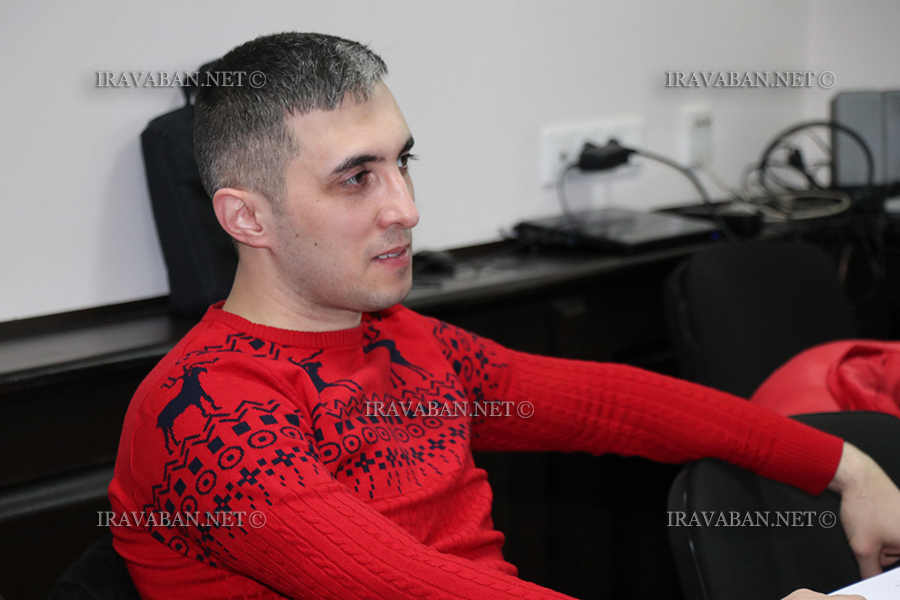The Ministry of Justice has developed a Draft Law “On Making Amendments and Addenda to the Law on Advocacy” within the framework of the strategic direction of the reform of advocacy sector. It has not yet been submitted for public discussion, but was sent to the Chamber of Advocates and all acting advocates for collection of preliminary opinions. Iravaban.net has started a series of interviews, which aims to present the observations and opinions of the advocacy community on the proposed changes.
We talked about the topic with Hayk Hayrapetyan, a member of the Chamber of Advocates.
– Mr. Hayrapetyan, in your opinion, what is the objective for implementing such changes?
– The draft law on amendments to the Law on Advocacy proposes to establish a disciplinary commission, which should include representatives of state bodies, which are not members of the subdivisions provided by the structure of the Chamber of Advocates, nor are they lawyers. Such a change is not in the interests of strengthening the independence of the advocate’s profession. Advocacy, by its very nature, is a stabilizer of the country’s legal system, and often carrying out human rights activities, which is one of the main missions of advocacy, and can be targeted by both the state bodies and the public. We often witness such an approach when the lawyer is identified with his client. Therefore, both the judiciary and the advocacy system must be free from outside interference and maintain their independence as far as possible. At first glance, it seems that the establishment of a disciplinary commission provides additional opportunities to examine the conduct of a lawyer, and international experience is presented as a justification, but we must take into account that there is a special situation in Armenia, and the peculiarities arising from that situation, in my opinion are not considered. An indicator for comparison can be the percentage of courts overturning the decisions of the Board of Advocates to understand the effectiveness of the Board and the expediency of creating a new, additional structure.
We must state that advocacy is one of the exceptional structures in Armenia today, which continues its independent activity, and getting acquainted with the draft law, I cannot say that the changes contribute to the strengthening of that independence.
– One of the proposed changes refers to the review of the role of the Board of the Chamber of Advocates and the Chairman of the Chamber in the executive management relations of the Chamber of Advocates, giving priority to collegial management. How do you feel about this proposed change?
– In general, collegial management is a positive idea in itself, and follows from the logic of ensuring the principle of restraint and checks and balances. The body, which consists of equal members, should benefit at first sight as a result of the development of collegial management. However, such changes should not be a catalyst for crises within the Chamber. In particular, with the new amendments, the Chairman of the Chamber of Advocates will not have the authority to initiate disciplinary proceedings against the lawyer, which means the weakening of the institution of the Chairman. This authority will be vested in the Disciplinary Committee, although the draft provides for the possibility of reviewing the decisions of the Committee through the Board of the Chamber. However, we can say that such an approach, in addition to overburdening the work of the Chamber with additional bureaucracy, will also create controversy between the various bodies of the Chamber, and as a result will lead to additional tension. There is no justification for making a double investigation within the Chamber, rather than appealing to a court after having a single decision, if there are such grounds. We should not forget that with the current regulations, the Board of the Chamber operates on a voluntary basis, no remuneration is provided for the work of the disciplinary commission, as a result of which additional problems may arise in attracting specialists with relevant qualifications and sufficient work experience.
– One of the proposals for changes refers to the possibility that the Public Defender’s Office will be able to organize public protection of persons through other persons who are not public defenders. Will the change be appropriate?
– In fact, this is not a new change, as lawyers have always provided free legal and advocacy assistance to people during their reasonable work, and now they continue to provide it. It is a common practice, as advocacy is first and foremost a human rights activity. This approach is more aimed at supporting the tax administration, the goal of which is, of course, the fight against the tax shadow, which has always been high in the field of providing services, but in terms of increasing the number of free legal services it will not have a significant impact. Instead it will create an additional workload for lawyers who will have to submit additional reports to the Chamber. Of course we have to fight against the tax shadow and the Chamber must also support that fight, but this change may have the exactly opposite effect, as lawyers may seek to refuse to provide free legal services to avoid unnecessary paperwork. So there are risks that must be taken into account.
– Which of the other changes proposed by the Ministry of Justice are problematic and what are the risks on the way to their implementation?
– There are certainly problematic points, which I have addressed in part while answering the previous questions, if we generalize, the problems are mainly the creation of additional disproportionate bureaucracy for both the Chamber and the lawyers, which can create more problems than solve them.
– How do the advocates perceive the proposed changes? Do you associate them with the results of the recent election of the Chairman of the Chamber?
– In general, the reason for the changes is not as important as the problems that need to be solved through change and the choice of the right toolkit to solve those problems. Any structure, be it self-governing or state, needs changes taking into account the evolving challenges. I cannot evaluate the draft in the form in which it currently exists and the changes that are proposed, as I do not see how the necessary guarantees for advocacy should be provided more effectively than before, or how the number of existing guarantees should be expanded. Instead, I see mechanisms for controlling lawyers and ensuring external intervention, which certainly cannot be in the interests of lawyers.
Meri Mnoyan


















